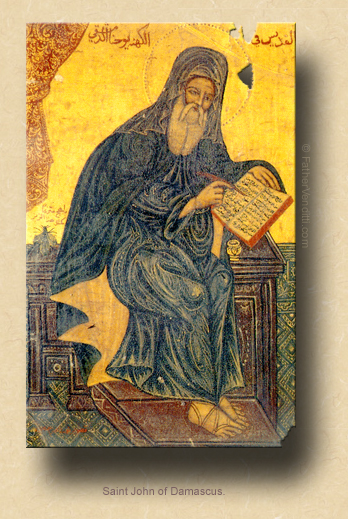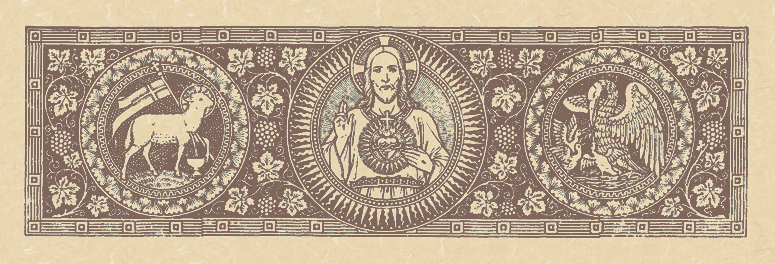A Faith which Defies the Laws of Physics.
The First Friday of Advent; or, the Memorial of Saint John Damascene, Priest & Doctor of the Church.
Lessons from the feria, according to the ordinary form of the Roman Rite:
• Isaiah 29: 17-24.
• Psalm 27: 1, 4, 13-14.
• Matthew 9: 27-31.
The Third Class Feast of Saint Peter Chrysologus, Bishop, Confessor & Doctor of the Church; and, the Commemoration of the First Friday of Advent.
Lessons from the common, according to the extraordinary form of the Roman Rite:
• II Timothy 4: 1-8.
• Psalm 36: 30-31.
• Matthew 5: 13-19.
The Twenty-Seventh Friday after Pentecost, the Third of Phillip's Fast; the Feast of the Holy Great Martyr Barbara; and, the Feast of Our Venerable Father John of Damascus.
First & Third lessons from the pentecostarion, second & fourth from the menaion,* according to the Ruthenian recension of the Byzantine Rite:
• Titus 1: 15—2: 10.
• Galatians 3: 23-29.
• Luke 20: 19-26.
• Mark 5: 24-34.
FatherVenditti.com
|
 9:14 AM 12/4/2015 — John Damascene, whose memorial we celebrate today and who went home to the Lord in the year 749, is considered the last of the great Fathers of the Church, those early apostolic and sub-apostolic writers to whom the Church owes so much of her theological and spiritual development. He is also a Doctor of the Church, the title the Church gives to those saints whose work was so important in formulating the deposit of faith so as to stand next to the Scriptures in influence. John Damascene, which is just an anglicized way of saying John of Damascus,—yes, he was an Arab—formulated much of the theological language we use today to refer to the Perpetual Virginity of the Mother of God, and anticipated the Dogma of the Immaculate Conception centuries before anyone had even uttered those words. 9:14 AM 12/4/2015 — John Damascene, whose memorial we celebrate today and who went home to the Lord in the year 749, is considered the last of the great Fathers of the Church, those early apostolic and sub-apostolic writers to whom the Church owes so much of her theological and spiritual development. He is also a Doctor of the Church, the title the Church gives to those saints whose work was so important in formulating the deposit of faith so as to stand next to the Scriptures in influence. John Damascene, which is just an anglicized way of saying John of Damascus,—yes, he was an Arab—formulated much of the theological language we use today to refer to the Perpetual Virginity of the Mother of God, and anticipated the Dogma of the Immaculate Conception centuries before anyone had even uttered those words.
It is also the First Friday of the month, and, as is our custom here at the Shrine, we will expose the Blessed Sacrament after Holy Communion today, and repose it at one-thirty. I recommend to your prayers during this Mass and the Holy Hour which follows the same intention I recommended to you yesterday: the victims of the most recent terrorist attack in California and their families. And, because it is Advent, I have decided that, instead of praying the Litany of the Sacred Heart, as we have been, today after exposition we will pray together the Litany of Penance, which has always been approved for private devotion but was never approved for public worship; but, it fits in well with the theme of penance and confession that I've chosen to embrace for Advent and the Jubilee Year of Mercy, so I promise not to tell if you won't.
Today's Gospel lesson is simplicity itself, and doesn't require much of a homily, except to say this: before curing the two blind men who are pursuing Him, our Lord asks them a question: “Do you believe that I can do this?” (Matt. 9: 28 NABRE). It seems odd—doesn't it?— that He should ask this. After all, why would they ask Him if they didn't already believe He could do it? But, remember, our Lord rarely performs a cure without some sort of lesson to go along with it; and, in this case, the lesson is about faith. Clearly, they had it, otherwise they wouldn't have approached Him; but, He forced them to bear witness to it. He made them speak it out loud to illustrate to them—and to us—that the gift of faith is not something private for ourselves alone, but must proclaimed.
Our faith is not something that has been given to us for our own personal consolation; it is a call to action, a call to evangelization. The faith we posses defies the laws of physics: it increases in us the more we give it away to others.
At the end of the lesson, our Lord commands them to say nothing to anyone about what He's done, and we've spoken about this “messianic secret” before which often follows our Lord's cures; but, I tend to think that, in this case, our Lord is imposing this requirement on them tongue-in-cheek. After all, He's just forced them to make a public Act of Faith as a prerequisite for the cure; I can't imagine He's now asking them to take it back. I think what He's doing is just throwing them an additional challenge to test them, to see whether the gift of healing He's given them has healed them in spirit as well as in body. And it did, because, as the Gospel says, “… they went out and spread the word of him through all that land” (v. 31 NABRE). Mission accomplished. Not only did they receive the greatest of gifts from our Blessed Lord, but they spread what they had received to others.
May we never shy away from telling everyone we meet about the great gift of faith that we have received.

* The lessons from the menaion are for the Martyr.
|

